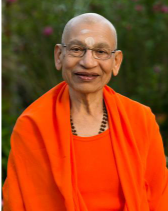
Spiritual Discourses: Respond to a situation appropriately
By Swami Viditatmananda Saraswati*
Dharma is the performance of actions in keeping with the values
Responsibility implies the recognition of one’s accountability in responding to every situation appropriately. Your actions should be in keeping with your position, role, and status, e.g., manager, father, teacher, friend etc. There is always a dignified response to every interaction. Recognize that whatever you do and say at any given moment is important and has some consequences.
Lord Krishna says [Bhagavad Gita, 2-47]:
Karmaeyevadhikaraste ma phaleshu kadachana,
ma karmaphalaheturbhurma te sango’stvakarmani.
Your choice is in action only, never in the result thereof. Do not be the author of the results of the action. Let your attachment not be to inaction.
Responsibility lies in performing actions in keeping with the values. Be honest, truthful, non-violent, and sensitive to the rights of others. Being responsible is also a way of surrendering to the order. Follow the order and surrender whatever tendencies you may have to potentially violate it. You may tend to get angry, greedy, selfish, and fearful. So that you act responsibly, you must subdue these tendencies. These hurtful tendencies need to be subdued every time you want to act in keeping with the basic values of life. This is one dimension of responsibility.
Your intentions also should be right. Your thoughts and words should be in alignment with your actions. Let there be honesty and transparency. Should you let yourself be hurt by a dishonest person by accepting him? Just as you avoid poison ivy and snakes, so also, avoid such people. Human beings can abuse their free will. The abuse of free will also arises out of helplessness and insecurity. Avoid such people and protect yourself. It is necessary to be alert and cautious while living in a competitive or aggressive society. This is also a responsibility.
Dharma is essential for discovering one’s true nature
Let every action become a means to invoke the goodness within us. This is how karma becomes yoga. The ultimate goal is to recognize that one is Brahman. Brahman is all goodness, kindness, truthfulness, and wholeness. If this is our nature and we want to discover it, how can it be that we act in a dishonest manner and hope to discover that goodness? We cannot discover our true nature this way. In fact, when we act in keeping with the order, we only oblige ourselves.
It is not true that honest people lose and dishonest people win; honest people do not always finish last. Of course, honesty alone does not guarantee that one will succeed in life. Success calls for talent, skills, abilities, confidence etc. You should think about what you ultimately want in life. Success and happiness are subjective phenomena, not external phenomena. We feel happy whenever we are respectful of ourselves and accept ourselves. That is when we discover satisfaction. If that is the criterion, why must we judge ourselves based on external criteria? We should judge ourselves based on our actions and not their outcomes. Being honest and good is conducive to self-respect.
We do not like ourselves when we are angry, reactive, and dishonest. The person who reacts then is not us; it is our anger that reacts. In fact, it is not we who get angry; it is anger that gets us! All action, when based on the values, is conducive to self-respect and self-worth. Various temptations have to be overcome in order to do what is right. For example, if we are required to exercise early in the morning, we will have to give up some comfortable sleep. Certain boundaries have to be drawn to control temptation. Tendencies to indulge, violate, compromise, and escape have to be kept in check. In the course of time, one can develop into an integrated person, a person who enjoys self-control or mastery over himself.
Lord Krishna refers to this as success [Bhagavad Gita, 5-7].
Yogayukto visuddhatma vijitatma jitendriya,
sarvabhutatmabhutatma kurvannapi na lipyate.
One whose mind is purified by being committed to a life of karma-yoga, who has mastered the body and has the sense organs under control, and who knows oneself to be the self in all beings, (such a person) is not affected even while doing (actions).
A life that is conducive to the purification of the mind, self-mastery, and self-control makes for an integrated person.
We have the favour, grace, or support of our own personalities. As Lord Krishna says, one’s own mind can be either a friend or an enemy; a mind that is under the sway of likes and dislikes, anger etc. is the enemy and a mind that is free from these hurtful tendencies is a friend. One must have a mind that is a friend so that one may enjoy its grace and support to have an integrated personality.
The violation of a value is a violation of one’s self
Even though there is a common idea of success, which is measured in terms of wealth and fame, it cannot be valued for its own sake. If this comes at the cost of yourself, you should reassess the value assigned to it. Giving too much value to such things is adhyasa, superimposition. Whenever a value is compromised for the sake of money, money becomes more important than the self. Whenever one violates a value, it is the self that is violated.
Values undergo change in every society, but some values, such as truthfulness and non-violence, are part of the universal order. That order is no different than us; it is our very selves. This is to be discovered. This is Advaita. When the order is violated, it creates a seed of conflict, guilt, non-acceptance, dissatisfaction, and discomfort. Acting in accordance with one’s own nature is conducive to integrity and harmony within the self.
To continue…
*Swami Viditatmananda Saraswati has been teaching Vedānta Prasthānatrayī and Prakaraṇagranthas for the last 40 years in Ahmedabad, Gujarat. Throughout the year, he conducts daily Vedānta discourses, accompanied by retreats, and Jñāna Yajñas on Vedānta in different cities in India and foreign countries.






